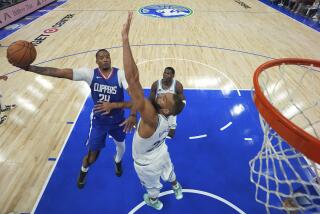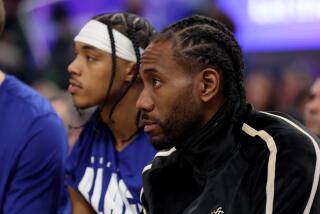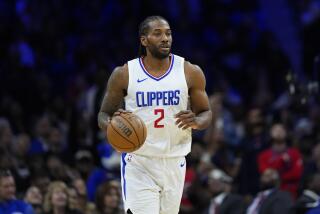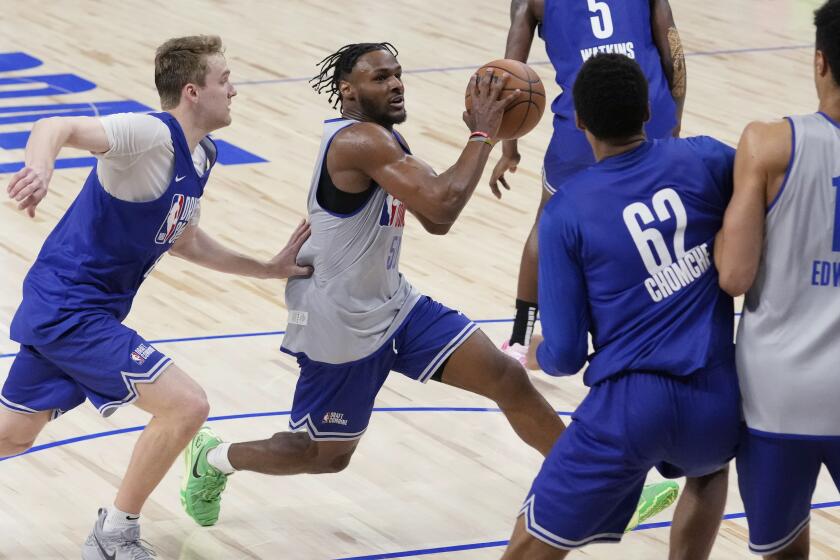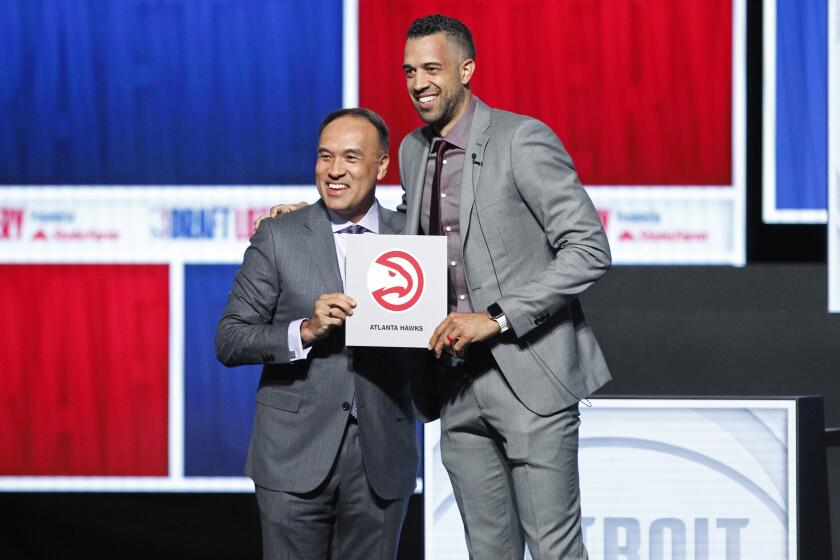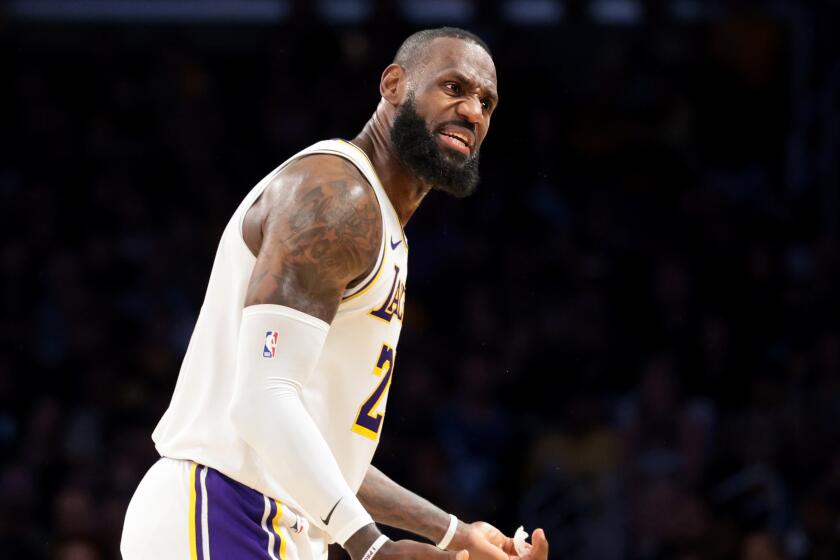ANALYSIS : Taking a Beating : If People Were Saying Only Good Things About the Clippers, It Would Be Very Quiet
Image is everything
--Andre Agassi, noted philosopher
In the midst of their endless summer, the Clippers are once again confronted with something far more threatening than Danny Manning near an open microphone, something even more troubling than another lottery party at Donald T. Sterling’s oceanfront digs.
Their image.
Clipper bashing, always in vogue among some factions, has reached new heights, which translates into new depths at the Sports Arena.
The concern the last few months, and maybe the next few, is what to do about it.
Lenny Wilkens and the lost weekend. Ken Norman and the lost starter. Danny Manning and the lost opportunity. Not to mention Larry Brown, Hubie Brown, Ron Grinker, no new arena, no new coach for more than two months. Don’t even think about ancient history, such as what went on during the season.
Maybe the problem is that they are in Los Angeles with the Lakers, which, by reputation and success, is a little like comparing Ted Baxter and Walter Cronkite.
Maybe the problem is that the most recognizable player, Manning, their first All-Star since 1986, can’t be used as a positive marketing tool, or even for the cover of the media guide. Not after the job he and agent Grinker have done on the organization, not while the Clippers have all but established an 800 number for teams to make trade offers.
Maybe, giving the Clippers the benefit of the doubt, it’s because their reputation has dug such a deep hole that reality can’t reach daylight.
Or maybe, just maybe, this image has been earned. Whether it is deserved can be debated, but that they have it cannot.
There is another option. Avoiding the topic.
“We don’t think of it in those terms,” said Andy Roeser, the team’s executive vice president for business operations. “The fact is, most people who experience us--listen to us on the radio or watch us in person or on television--enjoy the experience. Our goal is to improve all that any way we can.”
But do you think the Clippers have a bad image?
“We don’t think in those terms,” Roeser said. “We think in terms of the experience we provide.”
What does that answer mean?
“The answer is the answer,” he said.
*
The suggestion box is the suggestion box.
“You know what I think I would do?” said Joe McDonnell, a talk-show host at KMPC who has been covering Los Angeles sports since 1975. “To solve the image problem, I would trade Danny Manning, Stanley Roberts and Mark Jackson to the Lakers for Tony Smith and Duane Cooper. Then the Lakers would be a very good team again and win 50-plus games for another 10 years and nobody will even notice the Clippers exist.”
Among the several experts on marketing, public relations, image making and media coverage of the team contacted for this story, McDonnell, while often defending the basketball operations, is the most outspoken. He once proclaimed on the air that buying Clipper tickets is a great deal because you get two shows for the price of one--the team on the court and the circus in the front office.
But some suggestions are not so outrageous, given the premise that improving the image has to be based on the current makeup, management and home of the team.
A face lift, perhaps. New colors. A new logo. Maybe, to be very dramatic, a new name, possibly providing more of an identification with the city, something the Lakers do not have. Ladies and gentlemen, your Los Angeles Freeways!
The change of colors and logo is something the Clippers are considering now. The name change, too, has been kicked around. Because anything of that magnitude involves league-wide marketing, and that is already under way for this fall, the soonest a change could happen is 1994-95.
Another thought: Instead of Sterling staying out of the public eye and declining interview requests, take the aggressive approach and let the fans get their own sense of the team owner. Al Franken, whose Franken Enterprises has handled promotions for such events as the L.A. Open and the Sunkist track meet during 40 years of operation, points out that the Clipper image will not fully improve until Sterling’s does.
“From what I read, there is a lack of real authority there,” Franken said. “It sounds like no one even knows who has the authority to do certain things. . . . Obviously, Don Sterling is enormously successful. He knows how to run apartment buildings and make money. But you have to convince people he knows something about basketball.”
The Clipper plan has been to put General Manager Elgin Baylor at the forefront and not allow anyone else in management to speak with the media. They figured that would reverse the impression of a fractured front office. Meanwhile, officials from other teams still say they are not sure whom to deal with when they call to talk about personnel.
And Baylor is often inaccessible. When he does return calls, “no comment” is the common response, which does little to communicate the team’s thoughts on why, for example, Wilkens slipped away.
“There’s nothing worse than a no-comment or glossing over things,” Franken said. “That just makes the media angry and then they want to dig up more things.”
The Clippers have come to regret it sometimes. The most recent example is the blasts from Manning and Grinker. They were very critical, the team very silent, only later, having been deluged by negative publicity, to wonder if it was the right approach.
“We make the best decisions we can for the Clippers,” Roeser said. “And I think you can look for us being more articulate about why we do the things. But we won’t sink down to address issues we don’t think are appropriate.”
Meanwhile, the media finds more ammunition to paint the picture of a disorganized front office. When Larry Brown did a radio interview with XTRA the day after resigning, a member of the Clipper staff quickly called producer/sports anchor Joe Tutino at the station’s San Diego office with a request: Could we please have Larry’s phone number in Hawaii? That the media had a better handle on Brown’s whereabouts than the team made for a few chuckles that day around XTRA.
They should have been there a few years ago when the public-relations department was told to put together brief bios on many media members, at a time when they could have been lining up promotions. Hometown, college, all the basics. The misdirected energy was only one of the reasons several P.R. directors and assistants have quit over the years, making the publicity department as unstable as the coach’s chair.
*
Image isn’t only about wins and losses. The Cubs can be lovable, the UCLA football team of days past can be gutty, and even the worst of the NBA teams, the
Dallas Mavericks, can, with a new coach along with Jim Jackson and Jamal Mashburn, be young and hungry. The difference between having a few bad years and being branded as screw-ups is obvious.
Said Rick Feldman, general manager at Channel 13, the team’s television outlet, and admittedly a major Clipper fan: “To some extent, the problem the Clippers have is of their own making and part is not of their own making. A lot of it is a byproduct of the unfavorable reaction to the team the last two months, starting with Larry leaving when he had a contract. That put them in a situation to do something they were not prepared to do, and that was conduct a coaching search.”
So what to do about it now?
“We’ve had good players,” said Feldman, who has a background in sales and marketing. “But we have not had a dynamic player who is real verbal. . . . Charles Barkley and Michael Jordan, they’re very smart and verbal. But as good a player as Danny Manning is, he does not have an illuminescent personality.
“The Clippers’ pitch has got to be something like, ‘Take a closer look.’ They don’t have the best team, they don’t have the worst. It’s probably a middle team. But they can say: ‘Go to the arena and see some of the best teams play a team that will compete every night.’
“I don’t think you can create an impression falsely. You can’t go out with a campaign that says, ‘Clippers: We Can Do No Wrong.’ People aren’t going to buy it. The first few months of the season, if they play well and are exciting, the fans will be there. But if they don’t play well, then, deservedly so, fans will stop coming and people will say it’s the same old thing.”
This summer has made them say it already.
“Is there a player on that team you can use with a good spin?” said Jeff Witjas, a vice president with the William Morris Agency who represents such celebrities as Marvin Hagler and Jerry Lewis. “I don’t think so. Manning might have been that kind of guy, but he wants to leave. The problem is on the floor. It’s the players. Put the Clippers in the Forum and it’s the same thing. There is nothing that draws you, draws me, to come back and watch the Clippers again.”
Witjas should know. He had Clipper season tickets before giving them up.
“I just wasn’t excited about the Clippers,” he said.
*
Maybe getting ripped regularly in the newspapers, on call-in shows and by national networks isn’t such a bad thing, after all. Either that, or the calluses have formed.
“I’m pleasantly surprised so many people care about this team that they take the time to express themselves,” Roeser said. “That means they are interested, and that’s a very good thing.
“One of the great things about sports is that everyone has a point of view, and that’s great. It shows people care.”
In that case, people care a lot.
A Clipper Odyssey
Larry Brown’s resignation as Clipper coach left a void that took the organization two months to fill. Along the way, there were at least eight candidates. Some came close to being hired (Lenny Wilkens and Hubie Brown), others were interviewed (Gene Littles, Bill Musselman, Del Harris), and others the Clippers were denied permission to contact (Pat Riley, John Lucas, Rick Pitino). In the end, Bob Weiss met all the qualifications--he took the job.
More to Read
Get our high school sports newsletter
Prep Rally is devoted to the SoCal high school sports experience, bringing you scores, stories and a behind-the-scenes look at what makes prep sports so popular.
You may occasionally receive promotional content from the Los Angeles Times.
